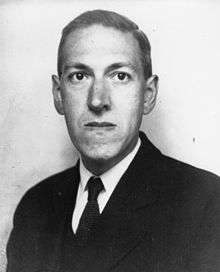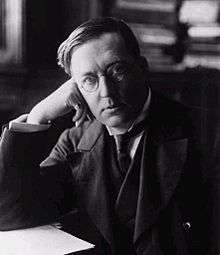Weird fiction

Weird fiction is a subgenre of speculative fiction originating in the late 19th and early 20th century. It can be said to encompass the ghost story and other tales of the macabre. Weird fiction is distinguished from horror and fantasy in its blending of supernatural, mythical, and even scientific tropes. British authors who have embraced this style have often published their work in mainstream literary magazines even after American pulp magazines became popular.[1] Popular weird fiction writers included Edgar Allan Poe, William Hope Hodgson, H. P. Lovecraft,[2] Lord Dunsany,[3] Arthur Machen,[4] M. R. James,[5] and Clark Ashton Smith.
Although "weird fiction" has been chiefly used as a historical description for works through the 1930s, the term has also been increasingly used since the 1980s, sometimes to describe slipstream fiction that blends horror, fantasy, and science fiction.
History
H. P. Lovecraft adopted the term from Sheridan Le Fanu and popularized it in his essays. In "Supernatural Horror in Literature," Lovecraft defines the genre:
The true weird tale has something more than secret murder, bloody bones, or a sheeted form clanking chains according to rule. A certain atmosphere of breathless and unexplainable dread of outer, unknown forces must be present; and there must be a hint, expressed with a seriousness and portentousness becoming its subject, of that most terrible conception of the human brain--a malign and particular suspension or defeat of those fixed laws of Nature which are our only safeguard against the assaults of chaos and the daemons of unplumbed space.
The pulp magazine Weird Tales published many such stories in the United States from March 1923 to September 1954. S. T. Joshi describes several subdivisions of the weird tale: supernatural horror (or fantastique), the ghost story, quasi science fiction, fantasy, and ambiguous horror fiction and argues that "the weird tale" is primarily the result of the philosophical and aesthetic predispositions of the authors associated with this type of fiction.[6][7]
Although Lovecraft was one of the few early 20th-century writers to describe his work as "weird fiction,"[1] the term has enjoyed a contemporary revival in New Weird fiction. For example, China Miéville often refers to his work as weird fiction.[8] Many horror writers have also situated themselves within the weird tradition, including Clive Barker, who describes his fiction as fantastique,[9] and Ramsey Campbell,[10] whose early work was deeply influenced by Lovecraft.[11]
Notable authors

The following notable authors have been described as writers of weird fiction. They are listed alphabetically by last name.
Before 1940
- Ryūnosuke Akutagawa[12]
- S. Ansky
- Honoré de Balzac
- Charles Baudelaire
- Gertrude Barrows Bennett
- E.F. Benson[10]
- Ambrose Bierce[13]
- Zealia Bishop
- Algernon Blackwood[14]
- Nelson S. Bond
- André Breton
- Max Brod
- Charlotte Brontë
- Charles Brockden Brown
- Arthur J. Burks
- Dino Buzzati
- Lord Byron
- Leonora Carrington
- Lewis Carroll
- Robert W. Chambers
- Hugh B. Cave
- Leonard Cline
- Irvin S. Cobb
- Mary Elizabeth Counselman
- Ralph Adams Cram
- F. Marion Crawford
- Walter de la Mare[10]
- August Derleth
- Lord Dunsany
- E. R. Eddison[10]
- C. M. Eddy, Jr.
- Erckmann-Chatrian
- Max Ernst
- Hanns Heinz Ewers
- Gustave Flaubert
- Friedrich de la Motte Fouqué
- Mary Eleanor Wilkins Freeman
- Théophile Gautier
- Charlotte Perkins Gilman
- Stefan Grabiński
- Sakutarō Hagiwara
- L. P. Hartley[10]
- W.F. Harvey
- Nathaniel Hawthorne
- Georg Heym
- William Hope Hodgson[10]
- E. T. A. Hoffmann
- Oliver Wendell Holmes, Sr.
- Robert E. Howard[10]
- Victor Hugo
- Joris-Karl Huysmans
- Washington Irving
- Margaret Irwin
- Carl Jacobi
- Henry James
- M.R. James
- Richard Jefferies
- Robert Barbour Johnson
- James Joyce
- Franz Kafka
- David H. Keller
- Rudyard Kipling
- Alfred Kubin
- Henry Kuttner
- Antoni Lange
- Joseph Sheridan Le Fanu
- Fritz Leiber
- Maurice Level
- David Lindsay
- Matthew Gregory Lewis
- Frank Belknap Long
- H. P. Lovecraft
- Leopoldo Lugones
- Edward Bulwer-Lytton
- Arthur Machen
- Guy de Maupassant
- Daphne du Maurier
- Wilhelm Meinhold
- Prosper Mérimée
- Abraham Merrit
- Gustav Meyrink
- Premendra Mitra
- C. L. Moore
- Thomas Moore
- Fitz James O'Brien
- Oliver Onions[10]
- Thomas Owen[15]
- Edgar Allan Poe
- E. Hoffmann Price
- Seabury Quinn
- Horacio Quiroga
- Ann Radcliffe
- Edogawa Ranpo
- Jean Ray
- Mercè Rodoreda
- Sax Rohmer
- Saki
- Sarban
- Bruno Schulz
- Mary Shelley
- M. P. Shiel[10]
- William Milligan Sloane III
- Clark Ashton Smith[10]
- Greye La Spina
- Vincent Starrett
- George Sterling
- Robert Louis Stevenson
- Bram Stoker
- Rabindranath Tagore
- J. R. R. Tolkien
- Luigi Ugolini
- H. Russell Wakefield
- Hugh Walpole
- Evangeline Walton
- Donald Wandrei
- Howard Wandrei
- H. G. Wells
- Edward Lucas White
- Henry S. Whitehead
- Oscar Wilde
- Donald A. Wollheim
1940–1980
- Robert Aickman
- J. G. Ballard
- R. H. Barlow
- Charles Beaumont
- Michel Bernanos
- Olympe Bhely-Quenum
- Jerome Bixby
- Robert Bloch
- Jorge Luis Borges
- Ray Bradbury
- William S. Burroughs
- Octavia E. Butler
- Ramsey Campbell
- Angela Carter
- Lin Carter
- Stepan Chapman
- Fred Chappell
- Arthur C. Clarke
- Julio Cortázar[16]
- Samuel R. Delany
- Philip K. Dick
- Harlan Ellison
- Philip José Farmer
- Carlos Fuentes
- Jane Gaskell
- William Gibson
- Shirley Jackson[10]
- Anna Kavan
- Gerald Kersh
- Garry Kilworth
- Jamaica Kincaid
- Stephen King
- Leena Krohn
- Tanith Lee
- Bob Leman
- Brian Lumley
- Richard A. Lupoff
- Gabriel García Márquez
- George R. R. Martin
- Richard Matheson
- Augusto Monterroso
- Michael Moorcock
- Alan Moore
- Haruki Murakami
- Joyce Carol Oates
- Mervyn Peake
- Terry Pratchett
- Ray Russell
- Joanna Russ
- William Sansom
- Claude Seignolle
- Rod Serling
- Michael Shea
- John Shirley
- Margaret St. Clair
- Peter Straub
- James Tiptree, Jr.
- Amos Tutuola
- Karl Edward Wagner
- Manly Wade Wellman[17]
- Jack Williamson
- Colin Wilson
- F. Paul Wilson
- Gahan Wilson
- Gene Wolfe
- T. M. Wright
- Roger Zelazny
1980–present
- Daniel Abraham
- Michal Ajvaz
- Iain Banks
- Clive Barker
- Laird Barron
- K. J. Bishop
- Poppy Z. Brite
- Kevin Brockmeier
- David F. Case
- Michael Chabon
- Michael Cisco
- Nancy Collins
- Mark Z. Danielewski
- Michael Dougherty
- Hal Duncan
- Dennis Etchison
- Brian Evenson
- Paul Di Filippo
- Jeffrey Ford
- Karen Joy Fowler
- Neil Gaiman
- Felix Gilman
- Elizabeth Hand
- M. John Harrison
- Brian Hodge
- Simon Ings
- Junji Ito
- Stephen Graham Jones
- Caitlín R. Kiernan
- T. E. D. Klein[10]
- Kathe Koja
- Marc Laidlaw
- Jay Lake
- Margo Lanagan
- John Langan
- Joe R. Lansdale
- Deborah Levy
- Thomas Ligotti
- Kelly Link
- Michael McDowell
- China Miéville
- Sarah Monette
- Grant Morrison
- Reza Negarestani
- David Ohle
- Ben Okri
- Otsuichi
- Helen Oyeyemi
- Cameron Pierce
- W. H. Pugmire
- Joseph S. Pulver, Sr.
- Cat Rambo
- Sofia Samatar
- Lucius Shepard
- William Browning Spencer
- Simon Strantzas
- Charles Stross
- Steph Swainston
- Enrico Teodorani
- Jeffrey Thomas
- Lisa Tuttle
- Steven Utley
- Jeff VanderMeer
- Liz Williams
- Christopher Howard Wolf
The New Weird
It has been suggested by some, predominantly Ann and Jeff VanderMeer and China Mieville, that Weird fiction has seen a recent resurgence, a phenomenon they term the New Weird. Tales which fit this category, as well as extensive discussion of the phenomenon, appear in the anthology The New Weird.[18]
See also
- Cosmic horror
- Dark fantasy
- Gothic fiction
- Horror fiction
- List of genres
- Lovecraftian horror
- Occult detective
- Supernatural fiction
- Surrealism
- Urban fantasy
Notes
- 1 2 Joshi, S. T. (1990). The Weird Tale. University of Texas Press. ISBN 0-292-79050-3.
- ↑ Joshi 1990, p. 168
- ↑ Joshi 1990, p. 42
- ↑ Joshi 1990, p. 12
- ↑ Joshi 1990, p. 133
- ↑ Joshi, S.T. "Introduction". The Weird Tale.
- ↑ Joshi 1990, pp. 7-10
- ↑ Gordon, Joan (2003). "Reveling in Genre: An Interview with China Miéville". Science Fiction Studies. 30 (91).
- ↑ Winter, Douglas E. (2002). Clive Barker: The Dark Fantastic: The Authorized Biography. HarperCollins. ISBN 0-06-621392-4., pp. 217-18
- 1 2 3 4 5 6 7 8 9 10 11 12 Joshi 1990, p. 231
- ↑ Campbell, Ramsey. "Chasing the Unknown", introduction to Cold Print (1993), pp. 11-13. ISBN 0-8125-1660-5
- ↑ VanderMeer, Jeff. "The Weird: An Introduction". Weird Fiction Review. Retrieved 7 June 2014.
- ↑ Joshi 1990, p. 143
- ↑ Joshi 1990, p. 87
- ↑ Gauvin, Edward. "Kavar the Rat". Retrieved 7 June 2014.
- ↑ Nolen, Larry. "Weirdfictionreview.com's 101 Weird Writers: #3 – Julio Cortázar". Weird Fiction Review. Retrieved 1 September 2014.
- ↑ Ross, Daniel. The Voice of the Mountains http://www.manlywadewellman.com/. Retrieved 27 July 2015. Missing or empty
|title=(help) - ↑ VanderMeer, Ann; Jeff VanderMeer (2008). The New Weird. Tachyon. pp. xvi. ISBN 978-1-892391-55-1.
References
- Joshi, S. T. (1990). The Weird Tale. University of Texas Press. ISBN 0-292-79050-3.
External links
- Blog devoted to the English writer W.H. Hodgson, pioner in the weird tale.
- H.P. Lovecraft, "Supernatural Horror in Literature"
- H.P. Lovecraft, "Notes on Writing Weird Fiction"
- China Mieville's top 10 weird fiction
- WeirdTalesMagazine.com, the original magazine of weird fiction
- WeirdFictionReview.com, a website by Ann and Jeff VanderMeer dedicated to the genre